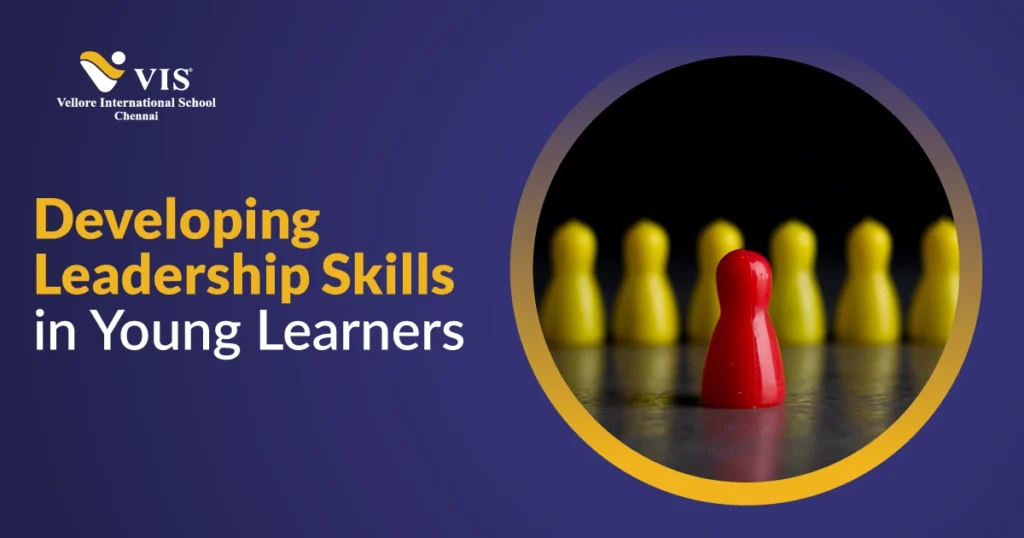Leadership is often seen as a quality reserved for adults in managerial or political roles. But the truth is, the foundation of leadership begins much earlier in life. Young learners, whether in primary or secondary school, already show signs of decision making, teamwork, creativity, and empathy, core traits of leaders.
By recognising these qualities early, parents and educators can nurture them into strong leadership skills that will benefit students throughout their academic journeys and into adulthood. This blog will explore why leadership matters for children
Why Leadership Skills Matter for Children
A) Confidence Building
Children who are given opportunities to take initiative learn how to trust themselves. This confidence carries into public speaking, academic projects, and personal growth.
B) Problem Solving Ability
Leadership is about facing challenges with resilience. When children are encouraged to think critically and independently, they develop resourcefulness that serves them in academics and life.
C) Collaboration and Teamwork
Leaders are motivators and collaborators. Introducing children to group projects and co-curricular activities helps them learn how to listen, cooperate, and guide peers.
D) Responsibility and Accountability
From classroom monitors to student council roles, early leadership roles teach accountability. Students begin to understand that their actions have consequences, both positive and negative.
Traits of Young Leaders
Before diving into methods, it’s essential to recognise the qualities that set the foundation for leadership in young learners.
1) Curiosity
True leaders are eager to learn. When children ask questions and actively seek knowledge, they demonstrate the curiosity needed to innovate and inspire.
2) Empathy
Understanding others’ perspectives and respecting their emotions helps children become compassionate leaders who value inclusivity.
3) Initiative
Leadership begins with action. Students who volunteer, take responsibility, or step up without being asked show initiative and ownership.
4) Resilience
Every leader faces setbacks. Young learners who recover from mistakes and keep trying display resilience, a vital leadership trait.
5) Vision
Imagining future possibilities and thinking beyond the present allow children to dream big and motivate others.
6) Integrity
Doing the right thing, even when unnoticed, shapes trustworthy leaders.
By identifying these traits early, educators can nurture and strengthen them, thereby developing leadership skills that grow over time.
Strategies for Developing Leadership Skills in Young Learners
1. Encourage Decision Making
One of the most effective ways to build leadership is by allowing children to make their own choices. These decisions can be as simple as selecting a book to read, choosing the theme for a class project, or deciding group roles during teamwork.
Such experiences teach them that choices have consequences and outcomes. More importantly, decision making builds confidence, nurtures responsibility, and shows children that their voice and perspective matter. Over time, this habit empowers them to lead with conviction.
2. Promote Team Based Activities
Teamwork provides fertile ground for leadership to grow. Sports, debate clubs, drama productions, and music groups are excellent spaces where children learn to collaborate, manage conflicts, and respect diverse perspectives.
Within teams, they practice problem solving, negotiation, and peer guidance, all of which are vital traits of a strong leader. Participation in these activities also highlights the importance of collective success over individual achievement.
3. Foster Public Speaking
A leader’s ability to communicate is one of their greatest assets. Encouraging students to speak at assemblies, participate in debates, or present class projects helps them overcome fear and articulate ideas clearly.
Public speaking improves self-confidence and prepares learners to take charge in larger group settings, a skill they will carry throughout life.
4. Teach Emotional Intelligence
Leadership is about guiding and connecting with other people. By teaching children empathy, self-awareness, and emotional regulation, we help them become compassionate leaders. Schools can integrate role-playing, mindfulness sessions, and reflective journals to build emotional intelligence.
These practices ensure students balance logic with empathy when making decisions.
5. Introduce Student-Led Initiatives
Practical experience is key to leadership growth. Student councils, eco-clubs, or community service projects offer children opportunities to lead peers in meaningful initiatives. These roles teach responsibility, accountability, and the value of collective action. They also provide a safe space for mistakes and learning.
6. Create Mentorship Opportunities
Pairing older students with younger ones builds accountability while spreading leadership throughout the school community. When seniors mentor juniors in academics or emotional support, both groups benefit, mentors strengthen their skills, and mentees gain confidence.
7. Encourage Reflection
Every good leader reflects on their journey. Reflection sessions, diaries, or guided feedback help students process experiences, identify strengths, and learn from mistakes. This habit of self-assessment ensures steady growth and maturity in leadership.
Role of Teachers in Nurturing Leadership
Teachers are role models and guides in shaping young leaders. They can:
- Provide Responsibility: Assign class monitors, group leaders, or project heads.
- Celebrate Effort: Recognise not only success but also attempts and persistence.
- Give Constructive Feedback: Help students identify strengths and areas for growth.
- Be Role Models: Demonstrate empathy, fairness, and strong communication in daily interactions.
Role of Parents in Leadership Development
Parents play a vital role in developing leadership skills at home. Some ways include:
- Allowing children to participate in family decisions, like meal planning or budgeting.
- Encouraging hobbies that require persistence, such as music, sports, or art.
- Setting an example by showing problem-solving, resilience, and empathy.
- Listening to their child’s opinions, thereby showing that their voice matters.
Overcoming Challenges in Developing Leadership Skills
While leadership potential is abundant in children, several challenges can arise:
- Overprotectiveness: Parents or teachers may prevent children from taking risks.
- Fear of Failure: Students may hesitate to step forward due to fear of making mistakes.
- Lack of Opportunities: Not all schools or families provide platforms for leadership.
- Comparison Pressure: Over-comparing children to peers may demotivate them.
By addressing these barriers, schools and families can create a safe environment where leadership thrives.
Real-Life Examples of Young Leaders
History is filled with examples of young leaders who changed the world through their courage and vision:
- Malala Yousafzai: Advocated for girls’ education at a young age.
- Greta Thunberg: Sparked a global climate change movement as a teenager.
- Iqbal Masih: Campaigned against child labour in Pakistan.
These stories inspire children to see that age is no limit to leadership.
How Vellore International School Shapes Leaders
At Vellore International School (VIS), Chennai, leadership is not treated as an extracurricular add-on but as an integral part of education. We foster a nurturing environment where students are encouraged to take initiative, build empathy, and engage in collaborative problem-solving.
Through student councils, leadership camps, and house activities, Vellore International School ensures that every child gets a chance to explore leadership roles. The school’s curriculum combines academics with co-curricular activities such as debating, sports, arts, and community service, creating balanced opportunities for children to lead both inside and outside the classroom.
Final Thoughts
Leadership is not something that begins at adulthood. It is a journey that can start as early as childhood, within the classroom, on the playground, or at home. By encouraging curiosity, resilience, empathy, and responsibility, schools and parents together can create an environment where leadership naturally flourishes.
Institutions like Vellore International School show us how a well-rounded approach to academics and co-curriculars can prepare students to be leaders of tomorrow. Ultimately, when we invest in developing leadership skills in young learners, we are investing in a brighter, more responsible, and compassionate future.
FAQs:
1. What are the best ways of developing leadership skills in young learners?
The best ways include encouraging decision making, promoting team based activities, fostering public speaking, teaching emotional intelligence, introducing student-led initiatives, creating mentorship opportunities, and encouraging reflection. These strategies help children build confidence, responsibility, and empathy from an early age.
2. Why is developing leadership skills important for children?
Developing leadership skills in children equips them with confidence, problem solving abilities, teamwork, and empathy. These qualities prepare them not just for academic success but also for real-world challenges, making them responsible and capable future leaders.
3. How can schools help in developing leadership skills among students?
Schools can create opportunities such as student councils, debate clubs, eco-clubs, drama, and community service initiatives. Teachers can guide students through decision making, public speaking, and reflection activities, ensuring leadership becomes part of everyday learning.
4. Can parents play a role in developing leadership skills at home?
Yes, parents play a vital role by encouraging children to make decisions, involving them in family discussions, supporting hobbies that require discipline, and listening to their opinions. This shows children that their voice matters and builds leadership confidence at home.
5. What activities can build confidence and leadership in shy children?
For shy children, gentle encouragement in public speaking, role playing, small group discussions, and arts based activities like drama or music can help. Pairing them with mentors or giving them small responsibilities gradually nurtures leadership without overwhelming them.


























